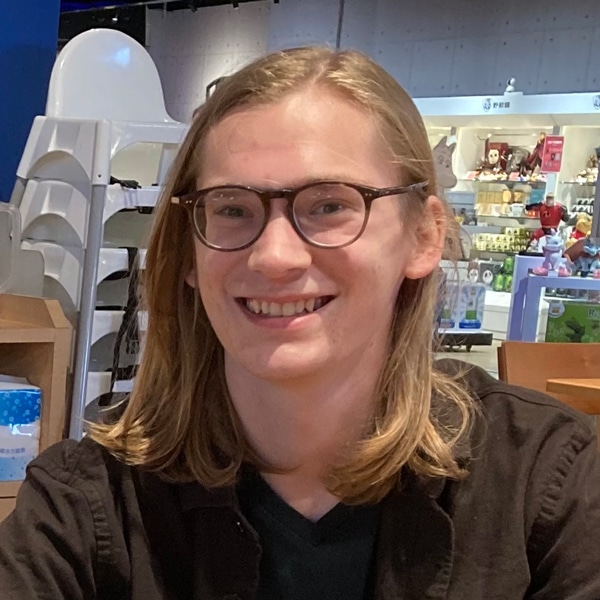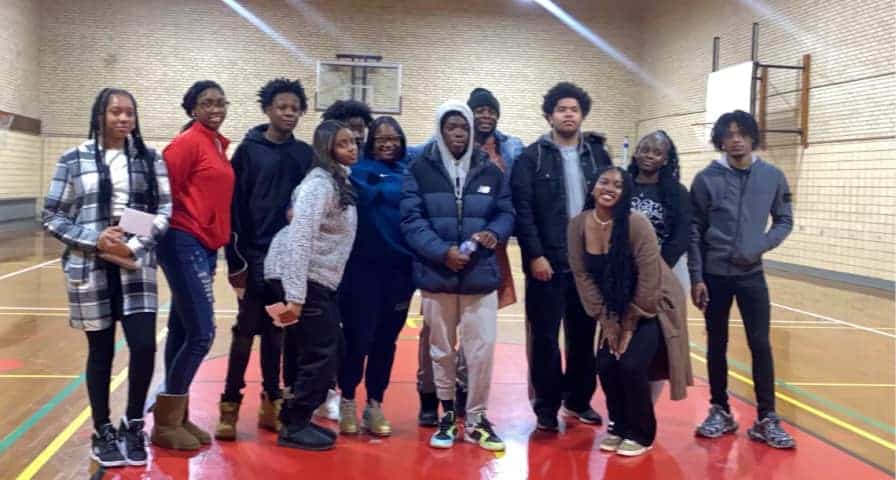Storytelling to Build Community: 2023 Peace Fellows Hold Speak Your Peace Workshop
Storytelling serves as an important medium for many Chicago Peace Fellows to raise awareness and promote solutions to problems that they face in their community. On October 21, the 2023 Chicago Peace Fellows hosted the Speak Your Peace workshop, dedicated to building power and community through inter-generational mixed-media storytelling. The event was held at the Chicago Center for Arts and Technology (CHICAT) on the West Side of Chicago. Peace Fellows on the Speak Your Peace team included: Nachelle Pugh, Antwan McHenry, Kanesha Walker Amaro, Carlil Pittman, Devonta Boston, Alexandra Auguste, Zahra Glenda Baker, Diane Deaderick DeMarta, Ceola Henderson-Bryant, and Lauryn Collins.
Speak Your Peace was one of a series of Summer Projects organized and hosted by the 2023 Chicago Peace Fellows to apply lessons learned through the GATHER curriculum to build peace within their communities. Peace Fellows participate in GATHER, an online asset-based community engagement course, as well as in-person training, collaborative action projects, and networking experiences with civic leaders, academic researchers, and policy makers throughout the year. These lessons culminate in a series of planning workshops where Peace Fellows can apply their newly learned skills and connections to a summer project that builds on the talents of their neighbors and the assets of their communities to make real and lasting change.
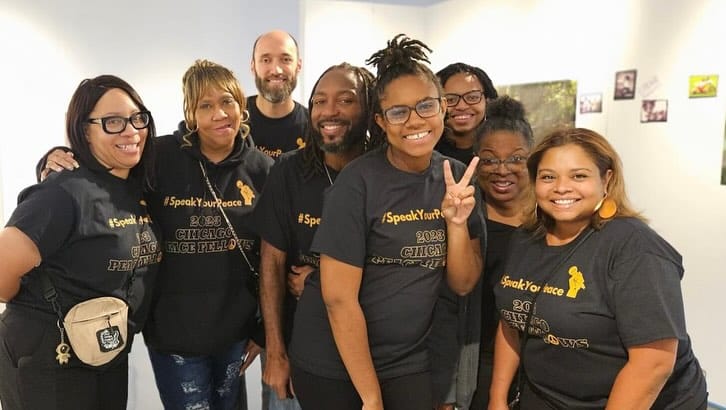
Throughout their fellowship, the 2023 Peace Fellows had a series of planning meetings where they set the scope of their Summer Projects: determining which beneficiaries to target, choosing potential community partners, and drafting a program. After determining projects and team members, the Peace Fellows met on their own to plan. “We were all sitting at the table and picking these projects, and our group felt it was really important for people to tell their story".
"In our community there are so many different things that go on, some of which are great and some of which are harmful and violent. We wanted to give people an opportunity to think about those things so that we can build on their experiences and make changes.”
- Nachelle Pugh
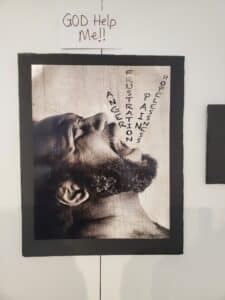
Centering Community Voices
The Speak Your Peace team sees storytelling as a way to show people from outside of their communities the challenges and triumphs of their neighborhoods. Nachelle elaborates, “Just looking [from outside] and trying to decipher what is going on is different from someone telling you what is going on. I think that’s what we were able to do with the storytelling at this event.” By providing a workshop and creative space for community members on the South and West side, Speak Your Peace aimed to center voices that are often ignored.
“To me it’s important to speak your peace, because if you don’t speak it, someone else will.”
- Kanesha Walker Amaro
By focusing on affirmative storytelling and highlighting the voices in the community, Speak Your Peace aimed to combat harmful narratives that are imposed from the outside.
Storytelling at the workshop showcased a variety of talents within the community with photography, art, poetry, music, and film working in unison to express a variety of voices. Hip hop artists, filmmakers, poets, and photographers from the community all had opportunities to present their talents. One of the featured artists was a filmmaker who started making films at the age of 17. At the event, the audience watched her documentary, filmed 7 years ago, which captures instances of police brutality that were spotlighted prior to the Black Lives Matter movement and shows the filmmaker’s view as an insider witnessing the violence. Another artist was a poet who used the space to share poems about her refusal to let any disabilities define her and allow her to center her experiences through poetry. The stories shared at Speak Your Peace were inter-generational and mixed-media, allowing for new connections to be generated between a range of communities.
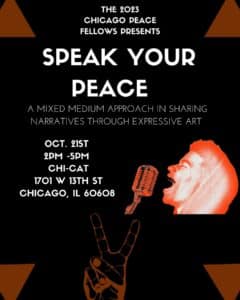
Mixed-Media Storytelling Build New Connections
Many of the Peace Fellows involved also had an opportunity to showcase their own artistic talents, which often do not have a chance to take center stage in their community work. For instance, Antwan McHenry curated a photography exhibit that showcased a variety of artists as well as his own work, which included a series of self-portraits he took during the height of the COVID-19 pandemic. Nachelle expressed admiration for his photographs, “Antwan, is an amazing photographer. […] Those pictures told a lot of stories of what was going on in his life, but probably also the lives of many others who were self-isolating. It was depression, it was confusion, it was chaos, it was sadness, it was the happiness at the end of the tunnel. All of those photos told the story of his experience.“ Kanesha, another 2023 Peace Fellow, also had the opportunity to share her poetry and bring in other local poets to perform.
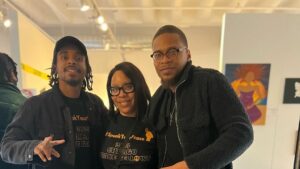
Speak Your Peace allowed for new connections to be made between artists and community activists across the South and West Sides. Reflecting on Speak Your Peace, Nachelle said that the most important thing accomplished was: “Building relationships with the community that was there."
"Working with the folks in our group, we got a chance to know each other, for real."
- Nachelle Pugh
We had been doing different workshops and activities, but we never really had a chance to [...] do the work that we do together and watch each other shine, and to be able to make suggestions with our personal experiences to help each other and make this event amazing. I think that’s the most important part and what I loved the most. Once we were done, everyone was like ‘yeah we gotta do this again and make it into something we do regularly’”. After the event, artists continued to connect and plan collaborations that will continue to center lived experiences for the world to experience and reflect on.
Generation Now 2.0: A Mutual Aid Collaborative Talk Show for Teens Produced by Teens
By: Michael Henderson, Director, Mutual Aid Collaborative
Generation NOW was conceived by Messiah Equiano, a 2021 Chicago Peace Fellow, and aims to provide opportunities for young people to work on a teen talk show that addresses everyday issues that teenagers face. The program pays teenagers to produce, direct, and act in the show and provides them with a safe environment to express their thoughts.
In August of 2022 Generation NOW filmed its first talk show that addressed “Dating and Violence”. Messiah Equiano, Executive Director of CHI-Rise, and Nicole Davis, Executive Director of the Talk to Me Foundation, saw first hand how therapeutic and empowering this platform was for teens. They deemed the first filming of Generation NOW as a success and proposed a second talk show to the Chicago Peace Fellows Mutual Aid Collaborative.
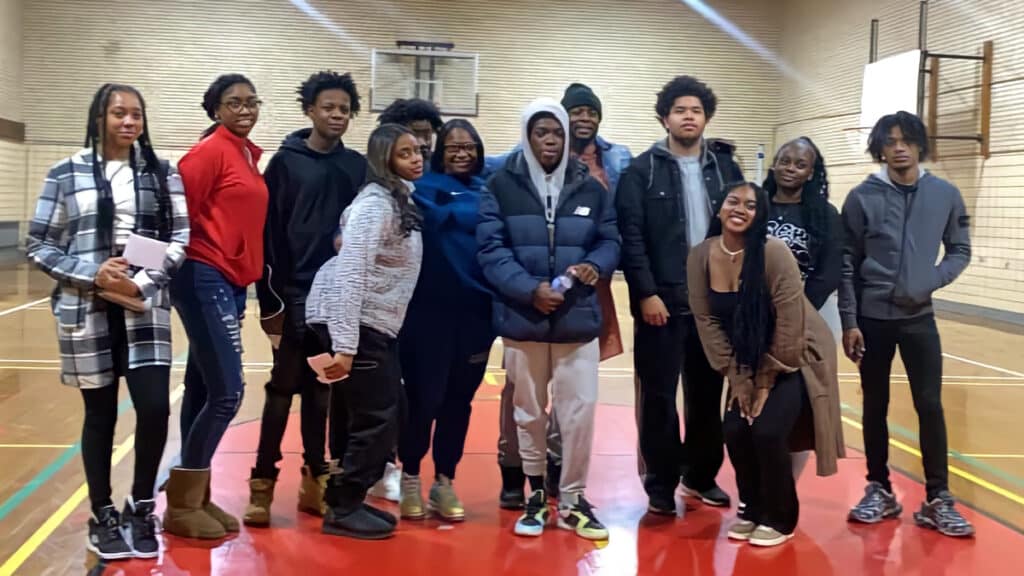
The Mutual Aid Collaborative consists of 74 Black and Brown leaders and committed allies who live and work in the communities they serve on the South and West sides. They have raised over $100,000 to support several active projects. The Mutual Aid Collaborative met and collaboratively voted to provide Generation NOW with the funding to film a second talk show at the Foster Park District.
Messiah and Nicole wanted to expand the dating conversation in the second filming and talk to teenagers about love. Nicole thought “Keeping with February as the month of Love and with so many young men and women at the ages of 12 and 13 dating, Generation NOW wanted to know what love looks like to them”. On Saturday, February 4, 2023 Generation NOW filmed a talk show focusing on young peoples’ understanding of love entitled “The Love Recording”.
Continuing the vision of the first talk show. Generation NOW provided young people with a safe setting to be open about their opinions, while also providing them with experience with different aspects of television production. Teens work on the project as writers, production members, or actors and were compensated for their work. Funds provided by the Mutual Aid Collaborative were used to pay ten teenagers $250 each for their involvement in a day of filming.
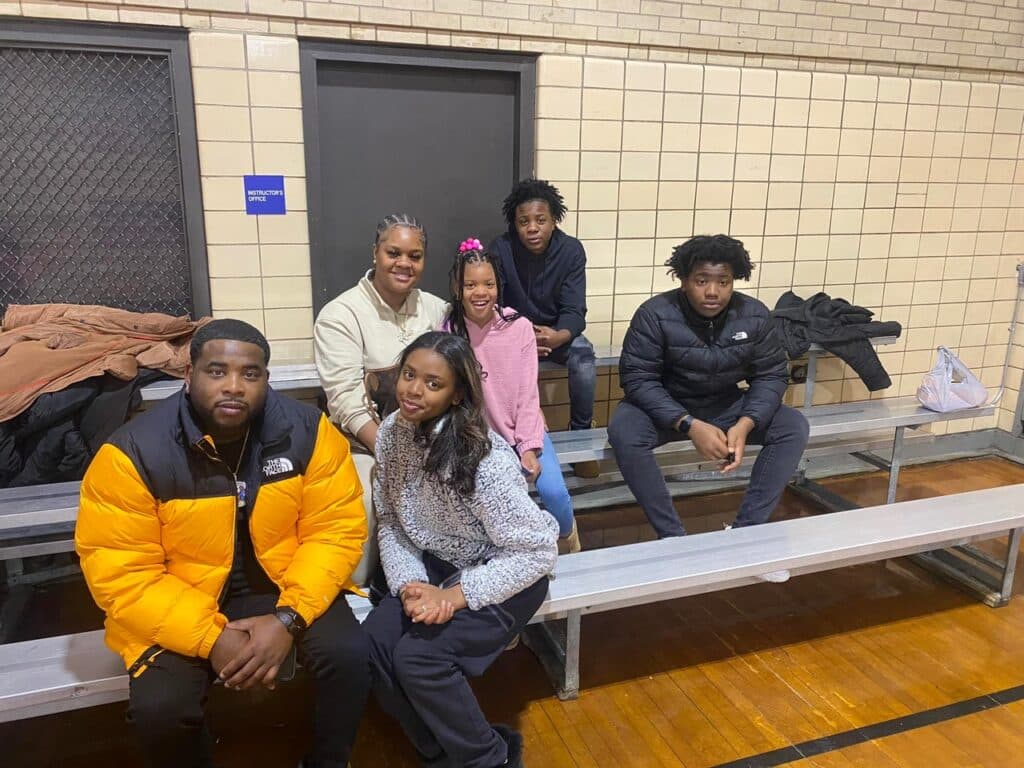
Messiah and Nicole agreed that teens are not always given the space to feel safe in the city of Chicago or in their homes and “it's ok to open up” and be vulnerable. The intimate and safe filming provided teens with a platform to voice their beliefs without judgment, but also with a chance to enact their visions in a production and to work together collaboratively. Each participating teen/young adult performed their expression of love through forms such as poems, monologues, and skits. Following the performances, discussions were held to explore the themes and messages of the show. The transparency and vulnerability of the answers according to the 25 plus attendees had the crowd “up in smoke”.
For one scenario performed at the “Love Recording,” young men and women were given flowers and candy to reenact how they will ask a person out for a date. The attendees were amazed at the vulnerability in the response and stories from the teens. The majority of the girls suggested that it's the responsibility of the guys to ask the girls out for a date, while some of the boys agreed that if a girl is asked out and has a boyfriend the girl should let the guy know. Another vulnerable teen shared his experience and story of being assaulted by a girlfriend. These stories allowed the teens to have open conversations about dating and the different kinds of expectations and responsibilities they feel in romantic life. The second filming was as successful as the first with both teens and parents participating with excitement.
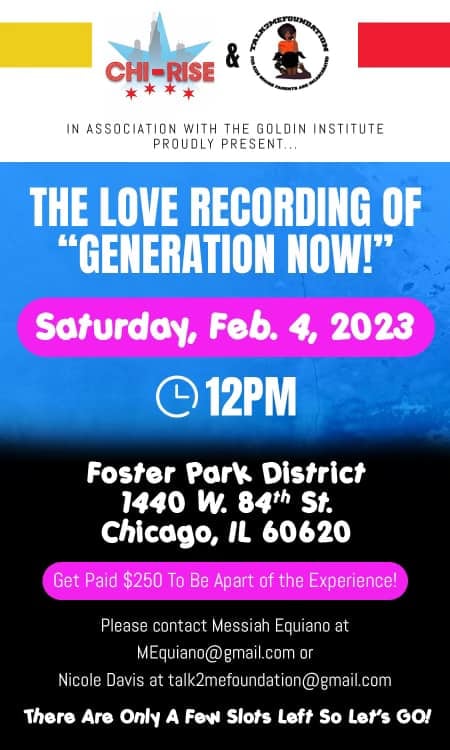
Generation NOW aims to provide teens with opportunities to express themselves. Messiah believes it's important to let teenagers know “they value their voices, they value their experiences, they value their input and their involvement in their communities”. CHI-Rise and the Talk to Me Foundation “want to give back” to their community and teens. They are looking to produce episodes of Generation NOW monthly. They are also looking towards expanding the programs to different communities, and looking specifically at communities with higher risks of violence and to get more parents involved.
Generation Now Helps Teens Produce New Talk Show
By Zeki Salah, Facilitator, Mutual Aid Collaborative
The Chicago Peace Fellows Mutual Aid Collaborative is introducing teenagers to work in the media industry through a project called Generation NOW. Generation NOW was conceived by Messiah Equiano, a 2021 Chicago Peace Fellow, and aims to provide opportunities for young people to work on a teen talk show that addresses everyday issues that teenagers face. The program pays teenagers to produce, direct, and act in the show and provides them with a safe environment to express their thoughts.
Messiah originally thought of the idea of a teen talk show in 2014 and pitched the idea to the television station WCIU. The project was initially based on a show that appeared on BET in the 90s and early 2000s called Teen Summit. Teen Summit provided a platform for teenagers to talk about the everyday issues they face and brought these issues into perspective within an open and safe environment. Messiah thought the idea of a teen talk show was valuable and conceptualized Generation NOW as a similar program that would also allow the young people to get involved in aspects of production.
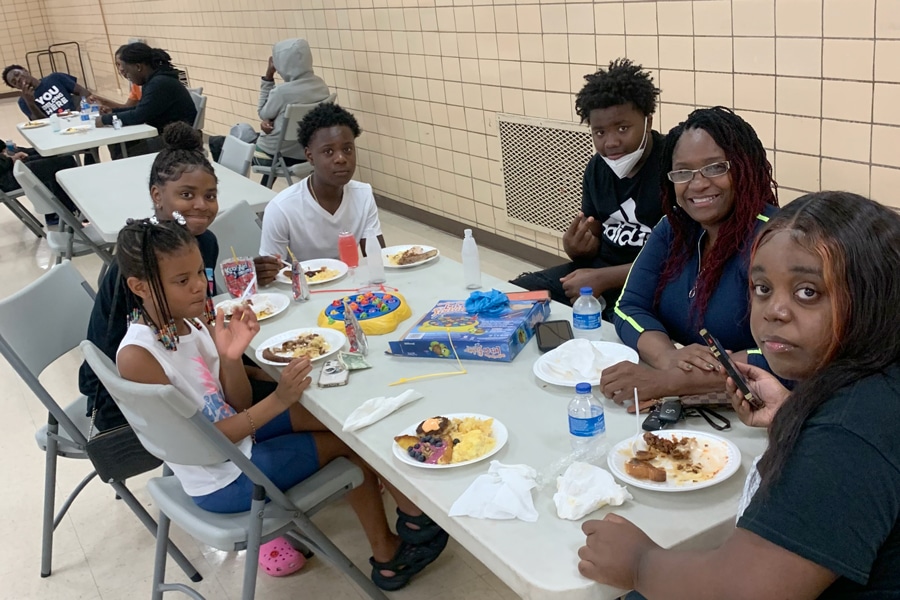
While the station turned down the pitch, Messiah persisted and applied for a grant from the Chicago Community trust to shoot a pilot episode of Generation NOW. He received the grant from the Chicago Community Trust in 2019 and filmed the pilot at Lawndale Community Academy. This experience showed him how therapeutic and empowering a platform for teens to express their issues could be. Since then, he has been working to secure funding to film more episodes of Generation NOW, including the August 5 filming that was funded by the Mutual Aid Collaborative.
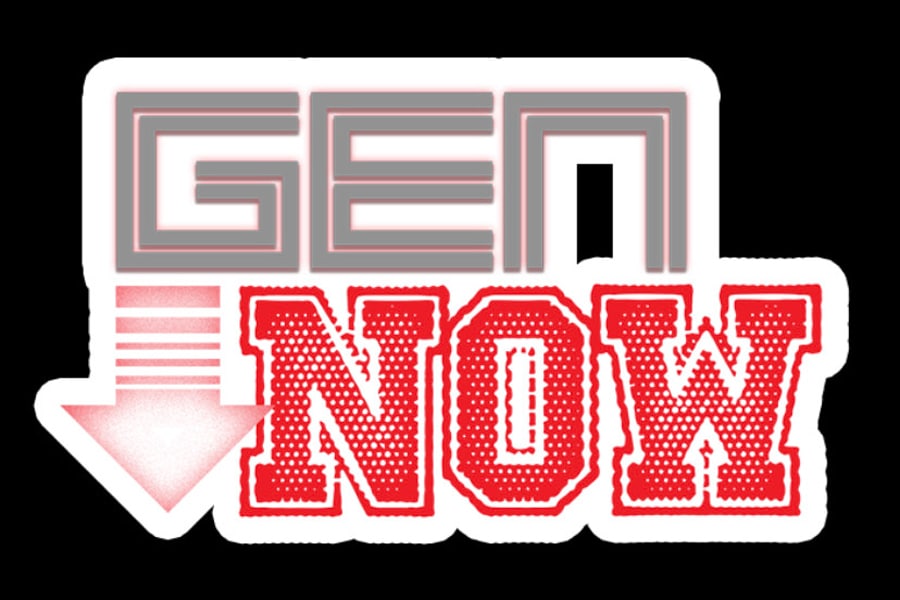
The Mutual Aid Collaborative is made up of 60 Black and Brown leaders and committed allies who live and work in the communities they serve on the South and West sides. They have raised over $86,000 to support several active projects, including Generation NOW. The Mutual Aid Collaborative met and collaboratively voted in May to provide Generation NOW with the funding to film another episode at the Foster Park District.
Generation NOW aims to provide young people with a setting to be open about their opinions, while also providing them with experience with different aspects of television production. Teens are invited to work on the project as writers, production members, or actors and are compensated for their work. On August 5th, the funds provided by the Mutual Aid Collaborative were used to pay 10 teenagers $250 each for their involvement in a day of filming. Funds were also used to provide them with meals and entertainment and also paid for a camera crew. Generation NOW aimed to provide the teens involved with a new opportunity to express themselves without judgment.
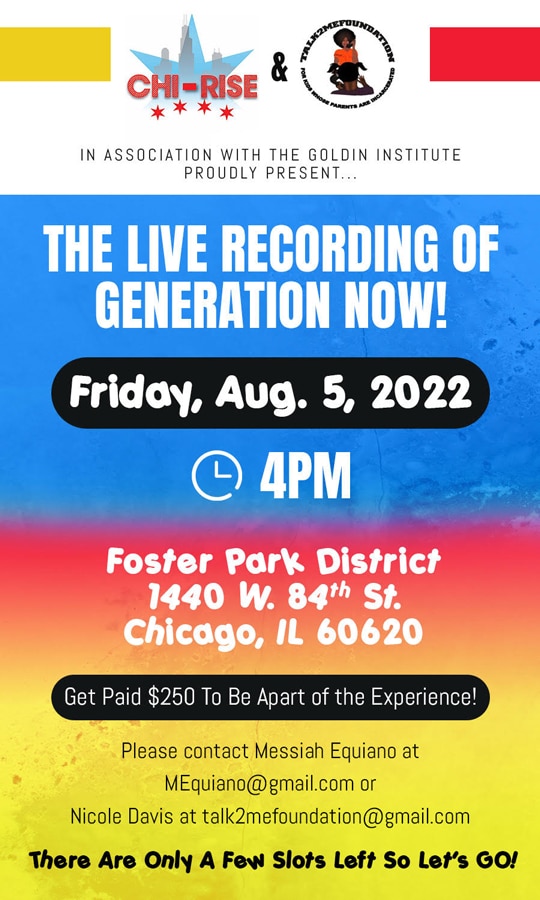
The young people were not only provided with food and time to get to know each other, but they were also told not to laugh at each other or dismiss opinions and were assured that the raw footage from the filming would not become publicly available.
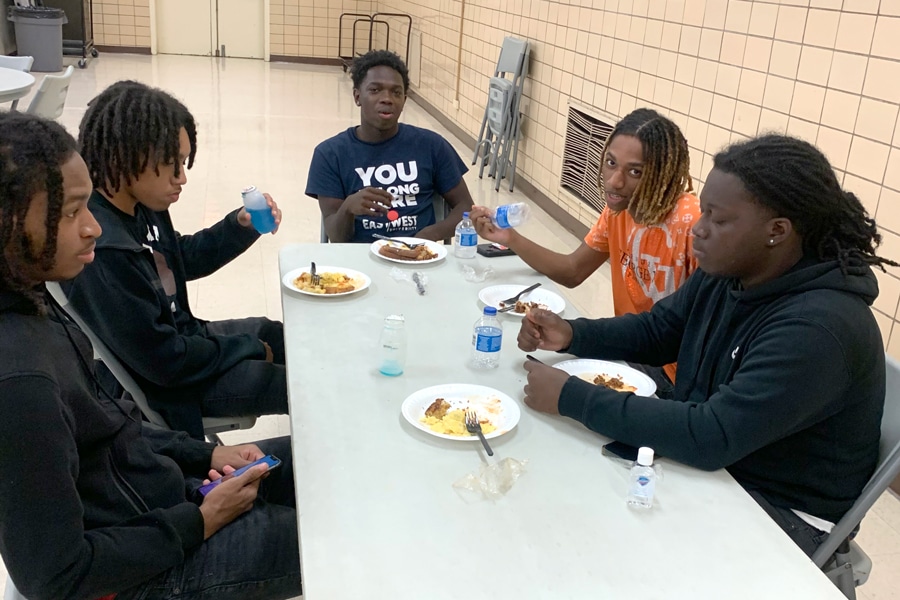
The filming of Generation NOW on August 5 was a collaborative effort between Peace Fellows. Alongside Messiah, Nicole Davis and the Talk to Me Foundation brought in actors and rehearsed together. As part of the filming, Nicole and her teens performed a skit where a woman accuses a man of stealing her purse, he denies stealing her purse, and she comes back with her brother to confront the accused man. At the end of the skit, someone approaches the woman and informs her that she left her purse in the bathroom and she apologizes. This scene was modeled after the experiences of the teens themselves, who gave input on how the scene might unfold.
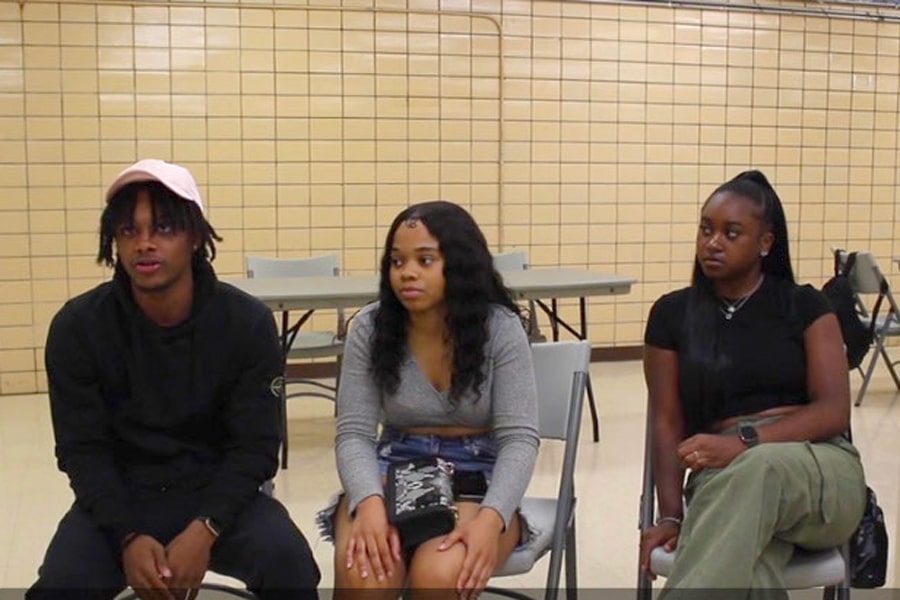
While Nicole led the rehearsal, the script of the conflict and resolution was developed by the teens. For instance, when asked what they would do if confronted about stealing, all of the young men at the filming responded that they would stand their ground during the confrontation and would not run away. The filming not only provided the teens involved with a platform to voice their beliefs without judgment, but also with a chance to enact their visions in a production and to work together collaboratively.
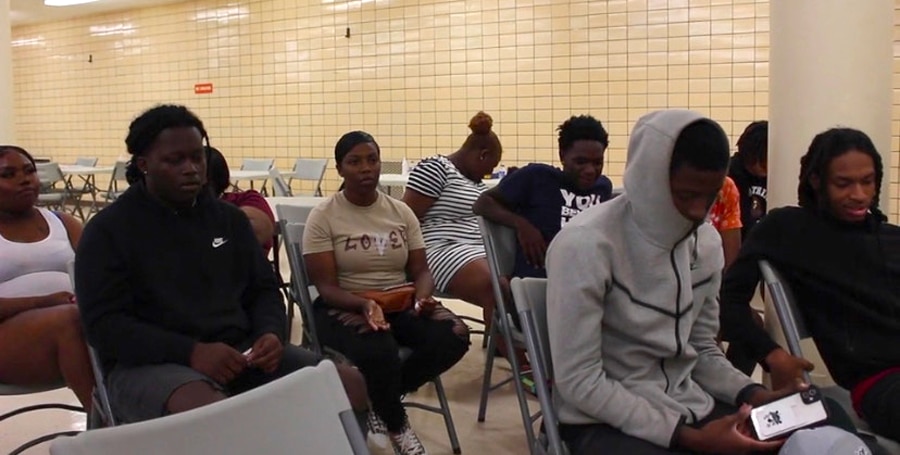
The response of the young people involved in Generation NOW has shown that the program is both therapeutic and empowering. Messiah spoke to the experience of the teens involved as they were provided with a platform to speak about topics like dating and conflict resolution: “Human beings hold onto so much in their hearts and their minds related to their experiences... Even if someone doesn’t express themself, just hearing another person make themselves available can make them feel better.” By continuing to provide this platform for teens and compensating them for their involvement, Messiah believes he can first them away from activities that might lead to violence:
[Generation NOW is about] getting a gun from someone’s hand and a camera into it. I’ve seen this in real life, I’ve seen people love it... you put a camera in his hand and he loves it. You’ve got to give them alternatives and have them get paid for it.”
Messiah’s organization, CHI-RISE, is looking for funding to continue to produce episodes of Generation NOW. They are also looking towards expanding the programs to different communities, and looking specifically at communities with higher risks of violence. Through community collaboration, they are hoping to help teenagers find work on the project during summer and winter recesses from school. Ultimately Messiah hopes to create a sustainable model for Generation NOW by getting members of the community involved and having them watch the show. Through creating content that gives back, Generation NOW aims to create safer and more connected communities.
